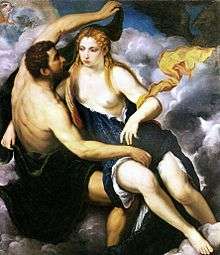Definify.com
Webster 1913 Edition
Io
I′o
,Definition 2026
Io
Io
- Note: This is uppercase i, not lowercase L.
English

Proper noun
Io
- (Greek mythology) The daughter of Inachus river god, and a lover of Zeus, turned by the latter into a heifer.
- (astronomy) A moon of Jupiter, known for its volcanic activity, peppered with about 400 active volcanoes.
- (astronomy) Short for 85 Io, a main belt asteroid; the asteroid shares its name with the Jovian moon
Translations
Derived terms
See also
Anagrams
Latin
Alternative forms
Etymology
From Ancient Greek Ἰώ (Iṓ).
Pronunciation
- (Classical) IPA(key): /ˈiː.oː/
Proper noun
Īō f (genitive Īūs); fourth declension
Declension
Fourth declension.
| Case | Singular |
|---|---|
| nominative | Īō |
| genitive | Īūs |
| dative | Īuī |
| accusative | Īō |
| ablative | Īū |
| vocative | Īō |
References
- Io in Charlton T. Lewis and Charles Short (1879) A Latin Dictionary, Oxford: Clarendon Press
- Félix Gaffiot (1934), “Io”, in Dictionnaire Illustré Latin-Français, Paris: Hachette.
See also
-
 Io (mythology) on Wikipedia.Wikipedia
Io (mythology) on Wikipedia.Wikipedia
io
io
English
Pronunciation
- IPA(key): /ˈaɪəʊ/
Noun
io (plural ios)
- A type of moth, the io moth.
- 1936, Paul Griswold Howes, Hand book for the curious
- These lines appear to serve as roadways or guides to any stragglers that may have hung back for some reason known only to an io.
- 1936, Paul Griswold Howes, Hand book for the curious
Etymology 2
From Latin ; compare Ancient Greek ἰώ (iṓ, “oh!”).
Interjection
io
- An exclamation of joy or triumph.
- 1913, Crowley, Aleister, “Hymn To Pan”, in Book 4, University of California Libraries, Magick in Theory and Practice:
- Do as thou wilt, as a great god can,
O Pan! Io Pan!
Io Pan! Io Pan Pan! I am awake
In the grip of the snake.
- Do as thou wilt, as a great god can,
-
Anagrams
Aromanian
Alternative forms
Etymology
From Vulgar Latin *eo, from Latin ego, from Proto-Italic *egō, from Proto-Indo-European *éǵh₂. Compare Romanian eu.
Pronoun
io
Related terms
See also
Esperanto
Etymology
From i- (indeterminate correlative prefix) + -o (correlative suffix of objects).
Pronunciation
Pronoun
io (plural ioj, accusative singular ion, accusative plural iojn)
- something (indeterminate correlative of objects)
Derived terms
- io ajn (“anything”)
Istro-Romanian
Etymology
From Vulgar Latin *eo (compare Romanian eu); from Latin ego, from Proto-Italic *egō, from Proto-Indo-European *éǵh₂.
Pronoun
io (first-person singular, plural noi)
Declension
| nominative | io | |
|---|---|---|
| accusative | stressed | mire |
| unstressed | me (m') | |
| dative | stressed | mi |
| unstressed | âm | |
| genitive | masc. sg. | meu/mev |
| fem. sg. | me | |
| masc. pl. | meľ | |
| fem. pl. | mele | |
Italian
Alternative forms
- jo (obsolete)
Etymology
From Vulgar Latin *eo, from Latin ego (“I”), from Proto-Italic *egō, from Proto-Indo-European *éǵh₂. Near cognates include French je, Portuguese eu, Romanian eu, and Spanish yo.
Pronunciation
Pronoun
io (personal, first person, possessive mio)
- I, the first person
Inflection
| subject | io |
|---|---|
| object | mi |
| prepositional | me |
| reflexive | mi |
See also
Latin
Etymology
Echoic; compare Greek ἰώ (iṓ), or English yo.
Interjection
iō!
References
- io in Charlton T. Lewis and Charles Short (1879) A Latin Dictionary, Oxford: Clarendon Press
- io in Charlton T. Lewis (1891) An Elementary Latin Dictionary, New York: Harper & Brothers
- Félix Gaffiot (1934), “io”, in Dictionnaire Illustré Latin-Français, Paris: Hachette.
- io in The Perseus Project (1999) Perseus Encyclopedia
- io in Harry Thurston Peck, editor (1898) Harper's Dictionary of Classical Antiquities, New York: Harper & Brothers
- io in William Smith, editor (1848) A Dictionary of Greek Biography and Mythology, London: John Murray
Neapolitan
Alternative forms
Etymology
From Vulgar Latin *eo, from Latin ego. Compare Italian io.
Pronoun
io
- I, the first-person singular nominative pronoun
Coordinate terms
| Number | Person | Nominative | Accusative | Dative | Reflexive | Possessive | Prepositional |
|---|---|---|---|---|---|---|---|
| singular | first-person | io (i') | me | mìo, mìa, mieje, meje | me, méne | ||
| second-person, familiar | tu | te | tùjo, tòja, tùoje, tòje | te, téne | |||
| second-person, formal | vuje | ve | vuósto, vósta, vuóste, vóste | vuje | |||
| third-person, masculine | ìsso | 'o, 'u (lo, lu) | 'i, 'e (li, le) | se | sùjo, sòja, sùoje, sòje | ìsso | |
| third-person, feminine | éssa | 'a (la) | 'e (le) | éssa | |||
| plural | first-person | nuje | ce | nuósto, nòsta, nuóste, nòste | nuje | ||
| second-person, plural | vuje | ve | vuósto, vòsta, vuóste, vòste | vuje | |||
| third-person, masculine | ìsse | 'i, 'e (li, le) | llòro | se | llòro (invariable) | llòro | |
| third-person, feminine | llòro | 'e (le) | |||||